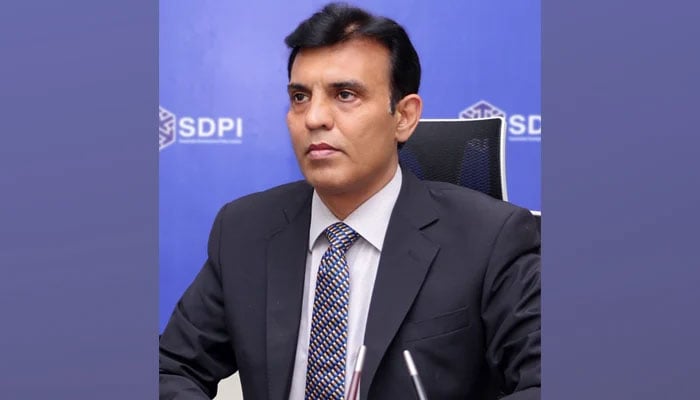Tech-based vision must to transform Gwadar into energy hub
Islamabad: Dr Abid Qaiyum Suleri, Executive Director, SDPI, has said that the discourse on a unique subject like Gwadar as an energy hub was pertinent and crucial at a time when the new government is about to take office in Pakistan.
Dr Suleri was speaking at a policy dialogue on “Gwadar as an energy hub of Pakistan: pathways for sustainable development’ organised here by Sustainable Development Policy Institute (SDPI) under its Network for Clean Energy Transition (NCET).
The SDPI chief further said the development of Gwadar as a port and a modern city has co-benefits that need to be identified. Due to COVID-19 and unavoidable geopolitical circumstances, Gwadar was not made functional at its full scale. It is still dependent on electricity imported from Iran whereas to make export zone functional will require more energy, he maintained. Since, the global community demanded to make three-fold increase in renewable energy (RE) share by 2030 at the COP-28, Pakistan is looking for renewable energy support from China as an excellent candidate for solar and offshore wind energy potential, he said.
Research scholar Dr Eram Ashraf observed that Gwadar is not connected to the national grid, so how it can become energy hub whereas it is important that the policy initiatives should be inclusive that means not only power players but also local communities should have their input and stakes in the decision-making process. The problems of protesting people, including women, needs to be addressed on priority bases,” she added.
Naghman Chaudhry, strategic analyst, said that keeping in view the recent developments in the Indian Ocean region and global geopolitical landscape, it is important for the country to embrace a change of mindset. He underlined that Gwadar is an alternate port that could be used to degravitate Central Asian Republics (CARs) from Russian influence as the Gulf oil reserves were to last not beyond 40 years. Since Karachi and Qasim Ports are susceptible to air and land attacks due to close proximity to hostile neighbouring country, Gwadar lied outside the potential war zone and was an ideal hub for trade and investment, he suggested.
Dr Scarlet Xiang Yang, Director, China Study Center, National University of Science and Technology, stressed the need to improve regulations, taxation regime and governance mechanisms to have efficient and well-defined potential forums facilitating investors and navigating dividends for better output.
Dr Hassan Daud Butt from Bahria University and former Director CPEC at the Ministry of Planning and Development, stressed that women of Balochistan are more pragmatic and participate in decision-making processes whereas the Baloch female students at Quaid-i-Azam University are passing their exams with flying colours, and thus they should be given voice in the policy making process, he said.
-
 Winter Olympics 2026: When & Where To Watch The Iconic Ice Dance ?
Winter Olympics 2026: When & Where To Watch The Iconic Ice Dance ? -
 Melissa Joan Hart Reflects On Social Challenges As A Child Actor
Melissa Joan Hart Reflects On Social Challenges As A Child Actor -
 'Gossip Girl' Star Reveals Why She'll Never Return To Acting
'Gossip Girl' Star Reveals Why She'll Never Return To Acting -
 Chicago Child, 8, Dead After 'months Of Abuse, Starvation', Two Arrested
Chicago Child, 8, Dead After 'months Of Abuse, Starvation', Two Arrested -
 Travis Kelce's True Feelings About Taylor Swift's Pal Ryan Reynolds Revealed
Travis Kelce's True Feelings About Taylor Swift's Pal Ryan Reynolds Revealed -
 Michael Keaton Recalls Working With Catherine O'Hara In 'Beetlejuice'
Michael Keaton Recalls Working With Catherine O'Hara In 'Beetlejuice' -
 King Charles, Princess Anne, Prince Edward Still Shield Andrew From Police
King Charles, Princess Anne, Prince Edward Still Shield Andrew From Police -
 Anthropic Targets OpenAI Ads With New Claude Homepage Messaging
Anthropic Targets OpenAI Ads With New Claude Homepage Messaging -
 US Set To Block Chinese Software From Smart And Connected Cars
US Set To Block Chinese Software From Smart And Connected Cars -
 Carmen Electra Says THIS Taught Her Romance
Carmen Electra Says THIS Taught Her Romance -
 Leonardo DiCaprio's Co-star Reflects On His Viral Moment At Golden Globes
Leonardo DiCaprio's Co-star Reflects On His Viral Moment At Golden Globes -
 SpaceX Pivots From Mars Plans To Prioritize 2027 Moon Landing
SpaceX Pivots From Mars Plans To Prioritize 2027 Moon Landing -
 J. Cole Brings Back Old-school CD Sales For 'The Fall-Off' Release
J. Cole Brings Back Old-school CD Sales For 'The Fall-Off' Release -
 King Charles Still Cares About Meghan Markle
King Charles Still Cares About Meghan Markle -
 GTA 6 Built By Hand, Street By Street, Rockstar Confirms Ahead Of Launch
GTA 6 Built By Hand, Street By Street, Rockstar Confirms Ahead Of Launch -
 Funeral Home Owner Sentenced To 40 Years For Selling Corpses, Faking Ashes
Funeral Home Owner Sentenced To 40 Years For Selling Corpses, Faking Ashes




